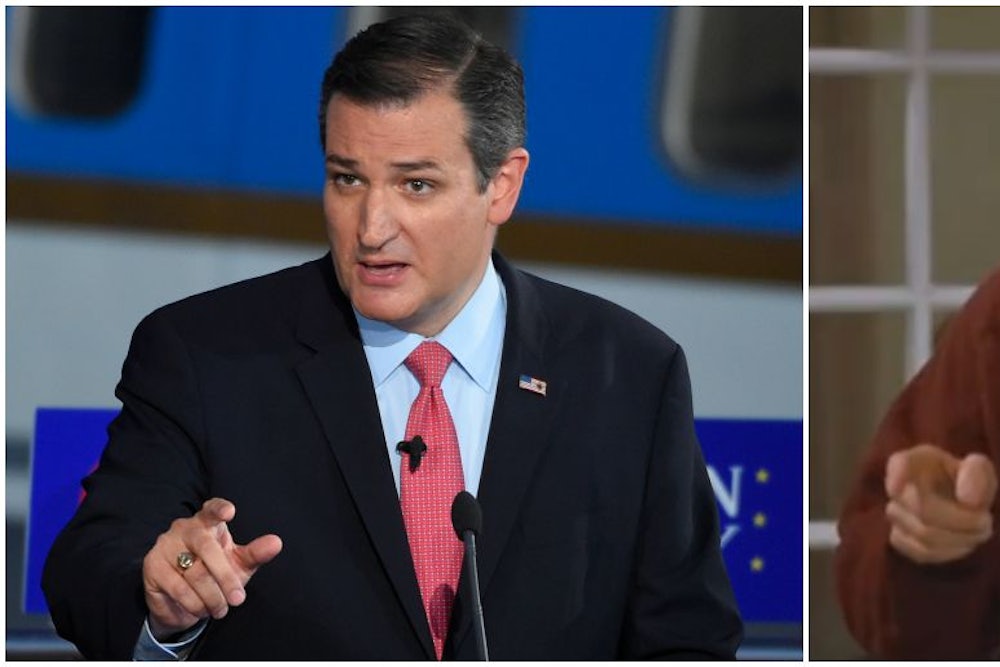In a classic episode of the sitcom Seinfeld, we learn that George Costanza’s father, Frank, has created a holiday called Festivus, celebrated on December 23 and marked by the annual “Airing of the Grievances.” Despite its fealty to its evangelical Christian base, the Republican Party seems to have adopted the pagan spirit of Festivus for its 2016 presidential primary. As evidenced by the two debates on Wednesday night, the GOP is deeply committed to airing grievances—perhaps even at the expense of winning elections.
What was remarkable in the debates—the four-candidate undercard, followed by the crowded main event—was how relatively little hostility was directed at President Barack Obama or Democratic front-runner Hillary Clinton. To be sure, both received pro forma swipes, but the real energy came from candidates arguing with each other over past Republican disputes about Supreme Court nominations, the war in Iraq, and government shutdowns. It was a backward-looking debate, with candidates focused on decisions the party made decades ago, and studiously avoiding pressing contemporary problems. Climate change was brushed aside as a non-concern while mass incarceration, brought up as a byproduct of a question from social media about medical marijuana, was only briefly acknowledged.
Of course, intramural arguments are by definition normal during primaries, but there was a particular intensity to the revisiting of old battles. It seems as if the Republicans are not just a conservative party but also a party trapped in the past, unable to move on from earlier feuds and disagreements which continue fester. Senator Ted Cruz got to the heart of the matter when he said, “We're frustrated as conservatives. We keep winning elections, and then we don't get the outcome we want.” That frustration was evident time and again, and explains the biggest fissure in the party, which isn’t so much between the establishment and the insurgents as between those who defend past decisions and those who think the party has made fundamental strategic errors.
One of the biggest fault lines was the judiciary. Cruz suggested Republican presidents George H. W. Bush and George W. Bush made grievous mistakes in appointing David Souter and John Roberts to the Supreme Court, both justices that Cruz thinks are insufficiently conservative. In effect, the Texas senator was offering a theory of American politics that blamed conservative failure on the last two Republican presidents. In the undercard debate, Louisiana Governor Bobby Jindal went further by criticizing the appointments of Anthony Kennedy and Sandra Day O’Connor, who ended up on the high court thanks to the sainted Ronald Reagan. In effect, the new right-wing party line is that the conservative movement has been stabbed in the back by Republican presidents.
In the undercard debate, Senator Lindsey Graham and George Pataki took on the role of tutor, trying to explain the basic functioning of government to Jindal and Rick Santorum. Again, the subtext was the division between those who accepted the Court decisions handed down by Republican judges and those who think that those judges are usurping legitimate authority.
A similar debate over past policies erupted over the Iraq War. Donald Trump, Senator Rand Paul, and Ben Carson all insisted that the war was a mistake and that they had opposed it at the time. Jeb Bush stoutly defended his older brother, who launched the war, by saying, “He kept us safe.” The Iraq War was a major event which continues to loom over current events, but does the Republican Party really want to be reopening wounds from that war in the run-up to the 2016 election?
Even debates about immigration and Planned Parenthood were about the past as much as the future, since hanging over them were previous rancorous debates about George W. Bush’s failed efforts at immigration reform and the controversial possibility of a government shutdown (from a party that still has bitter memories of the fallout of the 2013 shutdown).
Trump often gets blamed for the nastiness displayed in this primary season. But the way the other candidates kept returning to older intra-party disputes shows that there is something going on that transcends even Trump’s outsized personality. The GOP is a party that feels like it has lost its way, so it is turning on itself and fighting old battles. This cannibalism not only creates a primary filled with intense invective, but also prevents the party from dealing with newer problems.
The fact that the debates on Wednesday night were held in the Ronald Reagan Library, a shrine of conservatism, is all too appropriate. The Republican Party is still caught up in disputes that have roots in the Reagan era, if not earlier.
